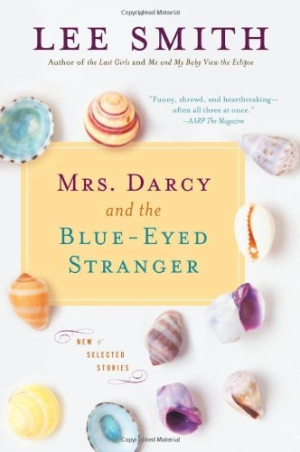
Mrs. Darcy and the Blue-Eyed Stranger
New and Selected Stories
Poets compare love with roses—but roses possess thorns. Writers often imply life always ends up all right—it doesn’t. Mrs. Darcy and the Blue-Eyed Stranger, by Lee Smith, offers fourteen short stories about overcoming the difficulties of life and love, accepting what comes, and becoming true to oneself.
Smith’s stories are firmly rooted in the South, and nearly all of them involve women who find major life events a springboard for self-evaluation and, usually, transformation. These women discover themselves, work through marital struggles, or seek acceptance. Many come from humble backgrounds and hope to better themselves; a few are rich and face the expectations of society. With few exceptions, each confronts stark pain resulting from troubles like death and infidelity (a recurring theme).
Smith’s plots range from a little girl coming to terms with religion to a mother dealing with her son’s murder conviction. One aging woman tells her life history through her folk-art sculptures, while another shares her story at a retirement home writers’ group. But each tale presents women changed by pain, often coming out stronger, wiser, or more resolute.
Smith has authored fifteen books of fiction, including Tender Ladies and Lost Girls, and three other short story collections. It’s evident why she won the Southern Book Critics Award and an Academy Award from the American Academy of Arts and Letters. She creates intensely real characters, whether a small boy, young woman, or elderly matron, and the reader is drawn directly into each character’s mind.
Perhaps because of this quality, the book proves an intense read. The stories often feel dark and brooding. And Smith throws the reader right into the characters’ anguish, flouting the advice of one minor character, “Keep your subject matter in check. We didn’t come here to be upset.” There’s a certain sameness of tragedy, loss, or struggle in the stories. While each story ends with the character overcoming hardship, the light presented at the end of the tunnel seems dim. However bleakly, it shines.
This book seems more appropriate for a rainy afternoon than a day at the beach. And it should only be undertaken by readers willing to trudge through the ugliness of life. But for those willing to do so, they will find vivid writing, sympathy for their own experience, and women who discover the strength to endure.
Reviewed by
Diane Gardner
Disclosure: This article is not an endorsement, but a review. The publisher of this book provided free copies of the book to have their book reviewed by a professional reviewer. No fee was paid by the publisher for this review. Foreword Reviews only recommends books that we love. Foreword Magazine, Inc. is disclosing this in accordance with the Federal Trade Commission’s 16 CFR, Part 255.
